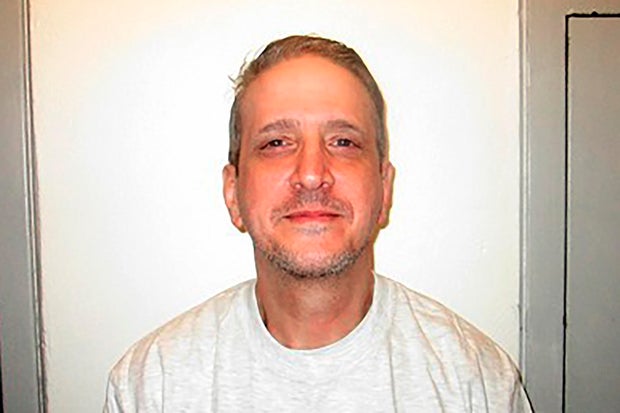Washington — It’s been nearly a decade since the Supreme Court first took up Oklahoma death row inmate Richard Glossip’s unsuccessful challenge to the state’s method of execution. On Wednesday, Glossip will be back at the Supreme Court, this time as the justices consider whether to toss out his conviction altogether and grant him a new trial.
In the 20 years since Glossip, 61, was convicted in a murder-for-hire scheme and sentenced to death, he has had nine execution dates scheduled and eaten his “last meal” three times. But in each of those instances, his executions were put off and his life spared.
The most recent reprieve came last year, when the high court agreed to block his death by lethal injection. Months later, the justices took up his bid for a new trial after Oklahoma’s top law enforcement official argued his conviction and sentence should not stand.
When the Supreme Court convenes for oral arguments, lawyers for Attorney General Gentner Drummond and Glossip, both represented by former solicitors general, will urge the justices to grant his bid for a new trial. The court appointed an outside lawyer, Christopher Michel, to argue in favor of upholding Glossip’s conviction and death sentence.
Drummond, a Republican, has argued in court papers that the state recently uncovered evidence that had been suppressed, revealing not only that prosecutors’ key witness against Glossip lied on the stand, but that they “knowingly elicited” his false testimony and failed to correct the record.
“Our system of justice places awesome powers and responsibilities in the hands of prosecutors. When those prosecutors themselves recognize that they have overstepped, that judgment cannot be dismissed as just another litigation position,” Drummond told the Supreme Court in a filing.
Glossip’s conviction and the attorney general’s bid for relief
Glossip was convicted in the 1997 killing of Barry Van Treese, the owner of the Oklahoma City motel where he worked. He was found guilty in two different trials (his first conviction was overturned because of ineffective assistance of counsel). In both, prosecutors relied on the testimony of his co-defendant, Justin Sneed, who claimed Glossip paid him $10,000 to murder Van Treese.
Sneed admitted to robbing and bludgeoning Van Treese and was sentenced to life in prison. Glossip has denied involvement in the murder and maintained his innocence.
During his second trial, Sneed told the lead prosecutor that he had never seen a psychiatrist, but was given lithium after he was arrested. Years later, in 2022, the state unearthed handwritten notes from the prosecutor in a banker’s box, which Drummond said called into question Sneed’s credibility as a witness.
The notes indicated that Sneed told the prosecutor he was given lithium after seeing a jailhouse psychiatrist and was diagnosed with bipolar disorder, according to court papers. But neither his diagnosis nor treatment by the psychiatrist were disclosed to Glossip’s defense team, indicating that the prosecutor elicited false testimony on the matter, Drummond wrote in court filings.
In light of the findings, the attorney general disclosed the box’s materials to Glossip and hired an independent counsel to review the case. The examination, which concluded in April 2023, found that if the defense knew that Sneed had been diagnosed as bipolar and prescribed lithium, they could’ve “impeached Sneed’s credibility, memory and truthfulness.” The independent counsel concluded that Glossip was “deprived of a fair trial.”
The state agreed that some of the errors committed during the trial rendered Glossip’s conviction and capital sentence flawed, and requested the Oklahoma Court of Criminal Appeals set aside his conviction and order a new trial.
But the state court denied the relief and ordered the state to execute Glossip. A request for clemency to the Oklahoma Pardon and Parole Board also failed.
Glossip turned to the Supreme Court, which in May 2023 granted a stay of his execution and, in January, agreed to take up his case. Justice Neil Gorsuch has recused himself, likely because of earlier proceedings when he was a judge on the U.S. Court of Appeals for the 10th Circuit.
Drummond told the Supreme Court in a filing that the errors identified by the independent counsel are “serious instances of prosecutorial misconduct” that must be remedied.
The case has divided state attorneys general and local and federal prosecutors. In one filing with the Supreme Court, attorneys general from seven states are calling for Glossip’s conviction to be upheld. They said the Oklahoma Criminal Court of Appeals, the state’s court of last resort for criminal matters, based its ruling on state law and should be respected by the federal courts.
But the group of prosecutors is calling on the Supreme Court to grant Glossip relief, arguing that he is at “imminent risk” of being wrongfully executed.
“Prosecutions must be premised upon an honest and completely transparent record to protect societal confidence in the verdict and the death sentence,” they said in a filing in support of Glossip.
Van Treese’s family, meanwhile, contests the notion that the prosecution concealed information from the defense. Instead, they said in a brief that the prosecutor’s notes reflect Sneed recounting what the defense team was asking him.
His wife, son and sister suggested that there may be political motivations underlying Drummond’s “confession of error,” given that death penalty cases and high-profile prosecutions can stir up strong feelings.
“It would not be surprising to find that one politically elected official might view the facts of a case one way, while another might go in a different direction,” they said. “But if officials are free to simply confess ‘error’ because they disagree with a case’s outcome, trust in the criminal justice system becomes the casualty.”
A decision in the case is expected by the end of June 2025.

